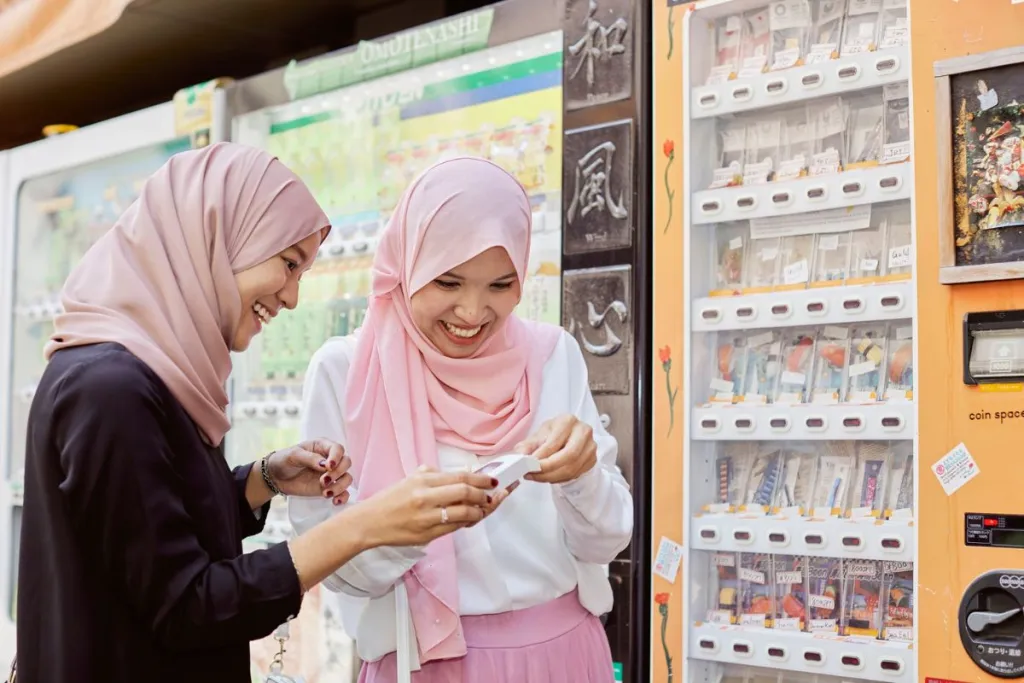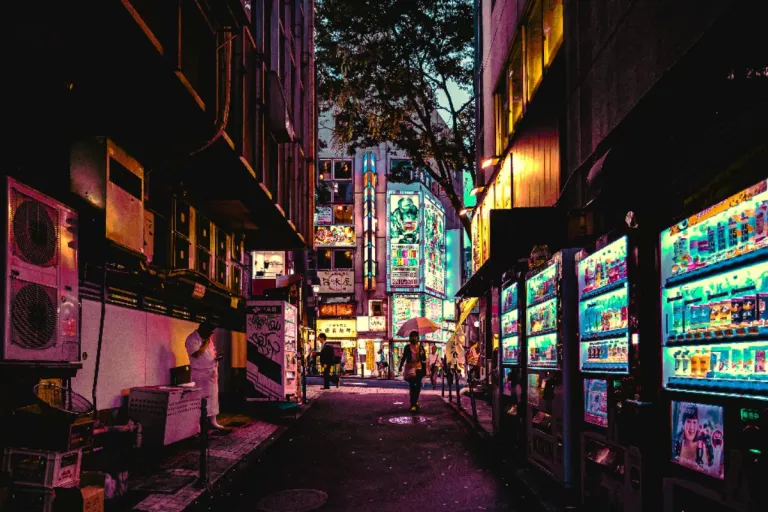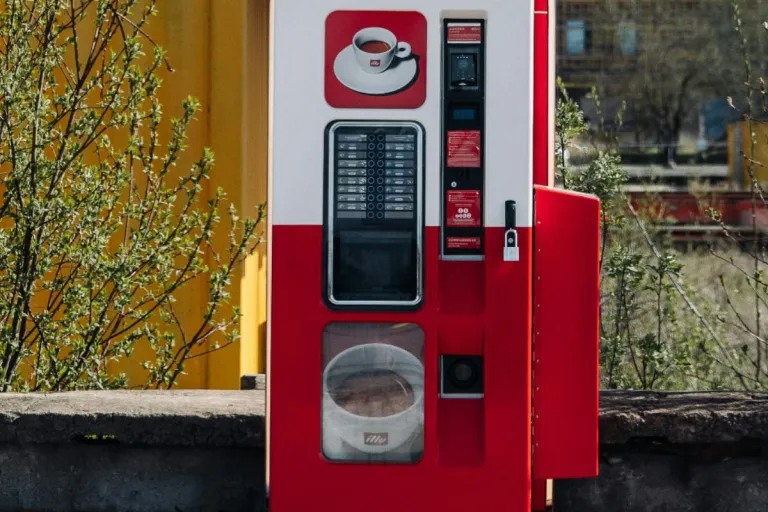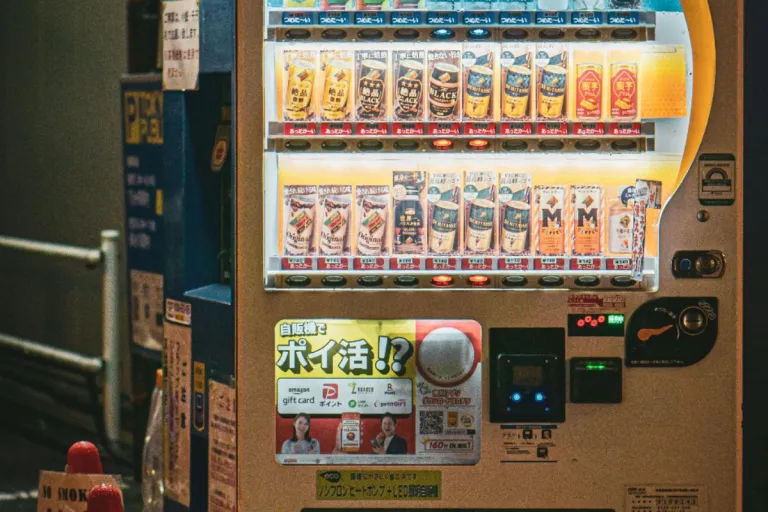Kowloon offers halal‑certified options for every craving Muslim travellers!
I Ate Halal Food From Vending Machines Around The World

When you hear “halal food,” vending machines probably aren’t the first thing that comes to mind. I get it. They didn’t for me either.
But while travelling through Japan, Malaysia, Singapore, and Taiwan, I stumbled onto something I didn’t expect—halal-certified meals quietly sitting behind glass, waiting to be discovered. No restaurant queues. No Google searches. Just a simple push of a button.
Here’s what I found—and why I think halal vending machines are one of the most interesting things happening in food and travel right now.
Japan
 Image credit: Aleksandar Pasaric
Image credit: Aleksandar Pasaric
If there’s one country that takes vending machines to another level, it’s Japan. You can get everything from umbrellas to neckties from a machine here, but I didn’t expect to find halal food.
The first time I saw one was in Saitama Prefecture, near a car auction centre. The machine was stocked only with halal-certified drinks—from bottled green tea to fruity sodas. Each item had a halal mark right on the label. It felt oddly comforting, especially in a place where finding halal food can sometimes be tough.
Later, I found out about a company called iWorks that installs halal vending machines in Japanese language schools. These machines are mainly for foreign Muslim interns living in Japan. They contain frozen halal meals—quick, clean, and clearly labelled. It was like the machine was saying, “We see you, and we’ve got you covered.”
Check Out: Halal Guide to Ride Japan’s First Bus-Train Hybrid Through Shikoku This Spring
Singapore
 Source: Anton Massalov
Source: Anton Massalov
Singapore knows how to mix convenience with quality, and halal food vending is no exception.
At the National University of Singapore, I walked up to a machine by Hei Sushi—the world’s first halal sushi vending machine. Yes, you read that right. Sushi, in a vending machine. And halal.
I grabbed a set with salmon nigiri and spicy tuna maki. It was surprisingly fresh—the kind you’d expect at a casual sit-down spot, not from behind a glass case. The machine restocks every four hours, so nothing sits too long.
But that wasn’t all. Near Anchorvale Road, I came across Petite Bakehouse’s vending machine, which serves halal-certified cookies, cakes, and sweet bread. I tried a chocolate chip cookie with a gooey centre. No exaggeration—it was perfect.
This wasn’t just about filling your stomach. It was about getting real food, made with care, without wondering if it fits your values.
Malaysia
Malaysia is known for its strong halal standards, so it didn’t surprise me to see vending machines marked “halal” in public places. What did surprise me was how serious people are about clear labelling.
During my stop in Selangor, I found a halal vending machine with snacks and drinks, all stamped with a JAKIM certification. But a local study showed that people still get confused by too many different halal logos. Some even avoid buying if they don’t recognise the one they trust.
That hit me. It’s not just about what’s halal—it’s about knowing who says it’s halal. For vending machines to really work in this space, the branding needs to be simple, clear, and universal.
That’s a challenge. But it’s also an opportunity.
Read More: A Muslim Traveller’s Guide to Spain: How to Plan The Perfect Halal-Friendly Journey
Taiwan
 Source: Boris Dahm
Source: Boris Dahm
I didn’t expect to find halal food in Taiwan. So when I heard about a vending machine with 20+ halal-certified Taiwanese snacks at the Taipei International Convention Centre, I had to go.
The machine was part of a government project to support Muslim visitors. From what I saw, it was doing a great job. I bought a pineapple cake (yes, halal-certified!) and plum juice. Both were delicious and locally made.
The best part? There are plans to expand these machines to train stations and tourist areas. For a traveller like me, that’s a game-changer. No more hunting down speciality stores. Just scan, buy, and enjoy.
Why These Machines Matter More Than You Think
Eating halal while travelling isn’t always easy. I’ve had moments where I skipped meals, ate just plain bread, or relied on snacks from home, just to avoid making a mistake.
These vending machines might seem small, but they represent something powerful. They say: You don’t have to guess here. You’re safe here. You’re seen here.
They also offer something else—freedom. I didn’t have to rely on restaurants, ask awkward questions, or settle for fish when I wanted chicken. I just walked up, tapped a screen, and ate without worry.
You Might Like: Halal Honeymoon in Sarawak: 10 Romantic Muslim-Friendly Activities
The future? More halal, more access, more trust
The global halal market is huge and growing. Experts say it’s heading toward $3 trillion soon. So it only makes sense that vending machines—those little hubs of convenience—are becoming part of the halal story.
What if we saw halal machines at every airport terminal? Every campus? Every hospital waiting room?
Imagine machines that let you choose based on allergy needs or cultural preferences. That scans your card and offers you personalised options. That speaks your language and shows you a clear halal certification.
That’s not a dream. That’s a product pitch waiting to happen.
Published at
About Author
Azmi Anees
Subscribe our Newsletter
Get our weekly tips and travel news!
Recommended Articles
15 Best Halal Foods in Kowloon, Hong Kong Top Muslim-Friendly Things to Do at The Newest Antara Genting Highlands It’s located between Peacehaven Campsite and Cradle Rock Genting Highlands, along Jalan Utama Genting Highlands
10 Best Halal-Friendly Destinations in The Philippines for Muslim Travellers Not just Boracay...
10 Best Halal Restaurants in Pattaya Serving Authentic Thai Cuisine Let's try Halal Authentic Thai Cuisine in Pattaya
10 Best Places for Muslim Travellers to See Tulip Festivals in 2025 Fun Fact: Tulips didn’t actually come from the Netherlands but Türkiye!
Latest Articles
KFC France Now Serving Halal Chicken: 24 Restaurants You Need to Know in 2026 KFC France announced that 24 of its 404 restaurants will serve certified halal chicken starting 21 Jan 2026..
Primark is Officially Coming to Dubai 2026: Opening Dates, Locations And Everything We Know 3 new stores in Dubai Mall, Mall of the Emirates and City Centre Mirdif
Muslim-Friendly Hotels in Singapore: Comfortable, Strategic, and Complete Facilities for Muslim Travelers Singapore offers many Muslim-friendly facilities, making it a comfortable destination for Muslim travelers from around the world
13 Best Hotels Near Bukit Jalil National Stadium for the Ultimate Concert Experience Planning a trip to Kuala Lumpur for your favorite idol's concert? Stay Here!
5D4N Muslim-Friendly Hong Kong & Macau Itinerary: A First-Timer’s Guide Here is a tried-and-tested 5 Days 4 Nights itinerary for your first Muslim-friendly trip!

